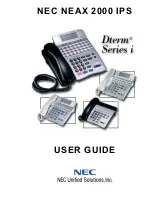
GE Multilin
L60 Line Phase Comparison System
5-225
5 SETTINGS
5.5 GROUPED ELEMENTS
5
In general, a breaker failure scheme determines that a breaker signaled to trip has not cleared a fault within a definite time,
so further tripping action must be performed. Tripping from the breaker failure scheme should trip all breakers, both local
and remote, that can supply current to the faulted zone. Usually operation of a breaker failure element will cause clearing of
a larger section of the power system than the initial trip. Because breaker failure can result in tripping a large number of
breakers and this affects system safety and stability, a very high level of security is required.
Two schemes are provided: one for three-pole tripping only (identified by the name “3BF”) and one for three pole plus sin-
gle-pole operation (identified by the name “1BF”). The philosophy used in these schemes is identical. The operation of a
breaker failure element includes three stages: initiation, determination of a breaker failure condition, and output.
INITIATION STAGE:
A FlexLogic operand representing the protection trip signal initially sent to the breaker must be selected to initiate the
scheme. The initiating signal should be sealed-in if primary fault detection can reset before the breaker failure timers have
finished timing. The seal-in is supervised by current level, so it is reset when the fault is cleared. If desired, an incomplete
sequence seal-in reset can be implemented by using the initiating operand to also initiate a FlexLogic timer, set longer than
any breaker failure timer, whose output operand is selected to block the breaker failure scheme.
For the L60 relay, the protection trip signal initially sent to the breaker is already programmed as a trip output. The
protection trip signal does not include other breaker commands that are not indicative of a fault in the protected
zone.
Schemes can be initiated either directly or with current level supervision. It is particularly important in any application to
decide if a current-supervised initiate is to be used. The use of a current-supervised initiate results in the breaker failure ele-
ment not being initiated for a breaker that has very little or no current flowing through it, which may be the case for trans-
former faults. For those situations where it is required to maintain breaker fail coverage for fault levels below the
BF1 PH
AMP SUPV PICKUP
or the
BF1 N AMP SUPV PICKUP
setting, a current supervised initiate should
not
be used. This feature
should be utilized for those situations where coordinating margins may be reduced when high speed reclosing is used.
Thus, if this choice is made, fault levels must always be above the supervision pickup levels for dependable operation of
MESSAGE
BF1 N AMP LOSET
PICKUP: 1.050 pu
Range: 0.001 to 30.000 pu in steps of 0.001
MESSAGE
BF1 LOSET TIME
DELAY: 0.000
s
Range: 0.000 to 65.535 s in steps of 0.001
MESSAGE
BF1 TRIP DROPOUT
DELAY: 0.000
s
Range: 0.000 to 65.535 s in steps of 0.001
MESSAGE
BF1 TARGET
Self-Reset
Range: Self-reset, Latched, Disabled
MESSAGE
BF1 EVENTS
Disabled
Range: Disabled, Enabled
MESSAGE
BF1 PH A INITIATE:
Off
Range: FlexLogic operand
Valid only for 1-Pole breaker failure schemes.
MESSAGE
BF1 PH B INITIATE:
Off
Range: FlexLogic operand
Valid only for 1-Pole breaker failure schemes.
MESSAGE
BF1 PH C INITIATE:
Off
Range: FlexLogic operand
Valid only for 1-Pole breaker failure schemes.
MESSAGE
BF1 BKR POS1
B
Off
Range: FlexLogic operand
Valid only for 1-Pole breaker failure schemes.
MESSAGE
BF1 BKR POS1
C
Off
Range: FlexLogic operand
Valid only for 1-Pole breaker failure schemes.
MESSAGE
BF1 BKR POS2
B
Off
Range: FlexLogic operand
Valid only for 1-Pole breaker failure schemes.
MESSAGE
BF1 BKR POS2
C
Off
Range: FlexLogic operand
Valid only for 1-Pole breaker failure schemes.
NOTE
Summary of Contents for L60
Page 10: ...x L60 Line Phase Comparison System GE Multilin TABLE OF CONTENTS ...
Page 57: ...GE Multilin L60 Line Phase Comparison System 2 27 2 PRODUCT DESCRIPTION 2 3 SPECIFICATIONS 2 ...
Page 58: ...2 28 L60 Line Phase Comparison System GE Multilin 2 3 SPECIFICATIONS 2 PRODUCT DESCRIPTION 2 ...
Page 482: ...6 26 L60 Line Phase Comparison System GE Multilin 6 5 PRODUCT INFORMATION 6 ACTUAL VALUES 6 ...
Page 554: ...10 8 L60 Line Phase Comparison System GE Multilin 10 2 BATTERIES 10 MAINTENANCE 10 ...
Page 674: ...B 110 L60 Line Phase Comparison System GE Multilin B 4 MEMORY MAPPING APPENDIX B B ...
Page 704: ...C 30 L60 Line Phase Comparison System GE Multilin C 7 LOGICAL NODES APPENDIX C C ...
Page 720: ...E 10 L60 Line Phase Comparison System GE Multilin E 1 PROTOCOL APPENDIX E E ...
Page 732: ...F 12 L60 Line Phase Comparison System GE Multilin F 2 DNP POINT LISTS APPENDIX F F ...
Page 742: ...H 8 L60 Line Phase Comparison System GE Multilin H 3 WARRANTY APPENDIX H H ...
















































